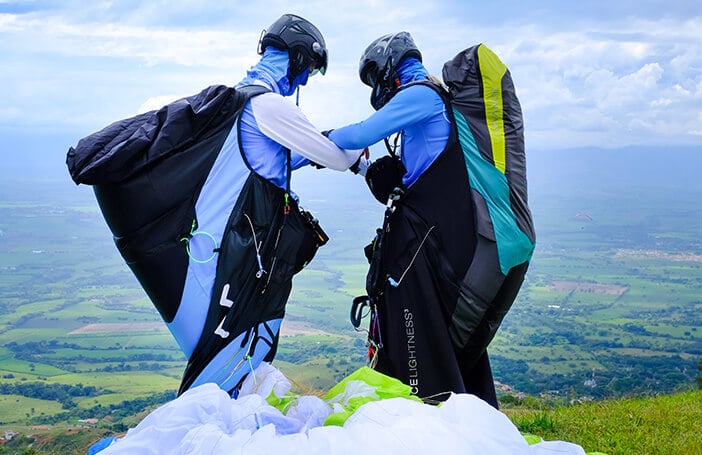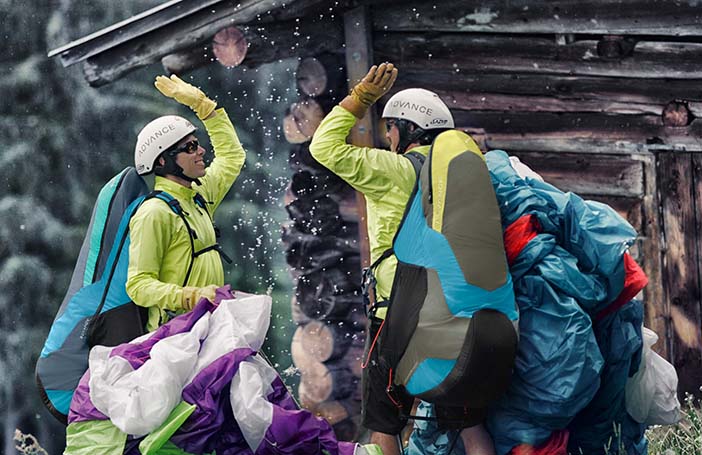Technical data
| SIZE |
32 |
35 |
| Weight range (kg) |
90-190 |
90-210 |
| Flat area (m2) |
32.00 |
35.00 |
| Flat span (m) |
12.52 |
13.10 |
| Flat aspect ratio |
4.9 |
4.9 |
| Projected area (m2) |
27.52 |
30.10 |
| Projected span (m) |
10.03 |
10.49 |
| Projected aspect ratio |
3.66 |
3.66 |
| Chord (m) |
3.1 |
3.1 |
| Number of cells |
49 |
49 |
| Glider weight (kg) |
6.15 |
6.45 |
| Certification |
EN B planned |
EN B |
Colours
Standard colours: Red - size 32, Turquoise - size 35

Package
- Wing
- Inner bag
- Compression strap
- GIN stickers
- Repair kit
Optional extras (Related Products)

Fuse mini: EXPAND YOUR POSSIBILITIES
- Wave Leading Edge for easier take-off in stronger winds
- optimised for higher wing loadings
- stable and comfortable feeling even in moderately turbulent air
The Fuse for high wing loadings
The Fuse mini builds on the success of the Fuse series of tandem wings and adds specific optimisations for flights at higher wing loadings. Take-off has been improved, top speed has been increased and the wing is more damped and compact in the air, whilst retaining energy for the flare.
Improved take-off in higher winds
The application of the Wave Leading Edge on the Fuse mini makes the wing easier to handle on windy take-offs. The wing sits easily on the ground, rises as a block and comes overhead with no biting or shooting.
Slightly reduced aspect ratio
The aspect ratio of the Fuse mini has been slightly reduced to make the wing feel even more compact and stable.
Increased top speed
The Fuse mini has a higher trim and top speed than its predecessor, thanks to the long trim riser and optimisations that enable flying at higher wing loadings. This gives you useful extra speed in situations such as penetrating valley winds or coastal flying.
Versatile weight ranges
The Fuse mini comes in two sizes, enabling pilots to select their size not just according to their weight, but also the conditions.
Well adapted fabrics
A working tool like the Fuse needs to stand up to long hours of service, whilst still offering a pleasant flying experience for both pilot and passenger. In partnership with local Korean fabric manufacturer Myungjin, GIN has introduced on the lower surface a new 29g PU-based composite quattro-coated fabric, and has further refined the Myungjin 40g and 32g used in the Fuse 3. We believe these fabrics represent the pinnacle of paraglider fabric development, offering durability whilst giving the wing excellent flying characteristics in areas such as inflation, take-off and handling. For the rib material, we opted for Porcher Skytex 40 hard finish due to its performance in this specific application.
Upgraded trim riser
The trim webbing material is the same used in the Fuse 4, 20% stronger than the previous material, giving you extended service. There is also a new, easier system to replace the trim webbing if it does eventually wear out.
Innovative big ears system
The Fuse mini big ear system is much easier and faster to both pull and release the big ears. Besides, the pilot can still use the brakes to steer the glider, useful, for example, to control the glide ratio on top landings. We also added a bridle cover to the standard spreader bars for a neater finish.

Features
- Wave Leading Edge improves take-off, pitch stability and landing at higher wing loadings
- Exclusive new 29g fabric developed by GIN and Myungjin offers outstanding performance characteristics and durability
- High top speed thanks to long trimmer and ability to fly at high wing loading
- 17cm trimmer range
- Replacable trim webbing
- Fully sheathed Edelrid lines for the best compromise of durability and performance
- Line and riser layout optimized for big ears (large area of A3 and split A-riser)
- Supplied with 20mm riser (724g). 12mm Kevlar risers (420g) are available as an option.
- Standard (hard, 780g ea.) or Supple (soft, 183g ea.) spreaders are available as an option.
Designer notes
Designer Gin Seok Song explains the philosophy behind the Fuse mini:
The main idea was to take all the good points of the Fuse and make some specific changes to reflect the fact that the wing will be generally flown at higher wing loadings.
The use of the Wave Leading Edge (WLE) gives the wing a more compact feel and an even more forgiving take-off. The wing is easier to handle on the ground in a stronger wind and rises as a block with zero shooting tendency. The WLE also helps to give a relatively low stall speed when landing at higher wing loadings.
We also slightly reduced the aspect ratio and further increased the pitch stability, making the wing easier to handle in rougher air besides being more comfortable for passengers.
We decided to offer 2 sizes so that pilots can choose their wing loading not just according to their weight but also the conditions.
Materials
Canopy cloth
Upper surface leading edge: Myungjin, MJ32MF 40g
Upper surface: Myungjin, MJ32MF 32g
Lower surface: Myungjin, MJ29MF 29g
Lines
Upper: Edelrid 7950-080 (Sheathed Dyneema)
Middle: Edelrid 7373-140 | 190 230 (Aramid)
Main: Edelrid 7343-140 | 230 | 420 | TGL 400 (Aramid / Dyneema)
Gin product registration
Register your Gin product here.
Downloads








